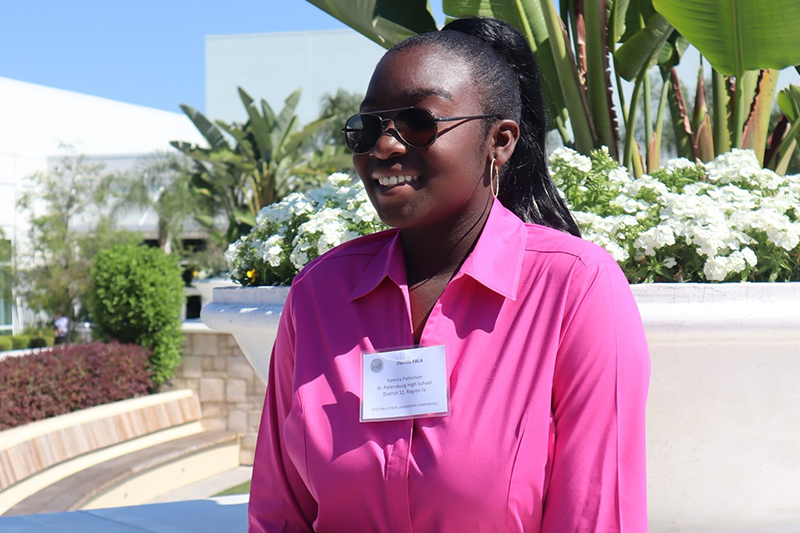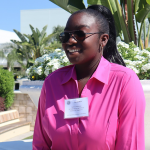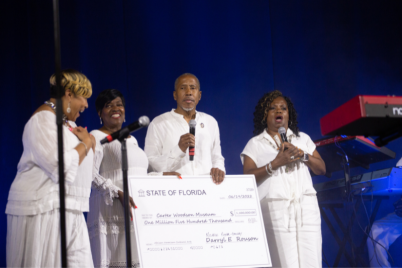BY YAMIRA PATTERSON, St. Petersburg High School student
Maya Matheney is a rising sophomore at St. Petersburg High School in the IB program. Her racial makeup includes Indian and African. She values her education, so she finds it extremely important to apply herself no matter the obstacle.
Maya thinks educating people about racism is crucial because it can help change opinions and develop a better, safer community.
YAMIRA: What are some of your experiences with racism and anti-Blackness in your school or past schools? How have your experiences affected your mental health?
MAYA: Fortunately, most of my teachers and peers are kind, educated people, so I have not experienced a ton of blatant racism or discrimination. Occasionally, people, mostly students, have acted like I am not as smart or intelligent as them. It seems that they don’t believe I possess the same mental capacity as they do because of my skin color. I have also noticed a lot of stereotypes that have been used against me, for example, African-American people coming from families of lower income when this is not true. This has made me feel especially lonely at times when I feel that I have no one to turn to about these kinds of issues. However, in a positive light, it has helped motivate me to prove those people wrong and reach my full potential regardless of racial stereotypes.
YAMIRA: What are some examples of microaggressions that you have experienced from teachers or peers? How have these microaggressions influenced your relationships with them?
MAYA: An example would be in a classroom discussion about race and stereotypes when classmates roll their eyes and whisper if I share my experiences or insights. It gives me the impression that my input is not valued, and some classmates believe that race relations are not a matter worth their time. I have learned not to let these behaviors affect me, and I try to disassociate myself from these kinds of people.
YAMIRA: Discuss a time where you felt like your teacher(s) made an effort to be intentional with their language about racism in their class? If so, how did that make you feel?
MAYA: This year, my class is reading “Things Fall Apart” by Chinua Achebe, which is about the European colonization of Africa. Before we even began reading, my teacher decided to teach about common stereotypes used against Africa and how racism can be embedded into our everyday lives. This made me feel extremely happy because she took the time to educate us and really seemed to take this issue to heart.
YAMIRA: What are your thoughts on “controversial” language like the term “minorities” and “illegals”? How has this language affected your experience in your school community?
MAYA: I feel that these terms can have a negative connotation depending on when and how they are used. If they are used by someone who has a lack of knowledge, they can become hurtful, derogatory words. It hasn’t specifically affected my experience other than making me feel uncomfortable around certain people or in certain situations.
YAMIRA: How has your relationship with BIPOC teachers affected your experiences in the classroom?
MAYA: Unfortunately, I have had very few BIPOC teachers throughout my academic career. When I have, it made me feel more comfortable in their classrooms when it came to certain topics, and it felt like I had an ally to turn to at school.
YAMIRA: In your experience, what have teachers and administrators done that has proven to be effective or harmful in approaching BIPOC students about combating racism in your community?
MAYA: Yes! I feel that most of my teachers understand the struggles of BIPOc students even if they aren’t BIPOC themselves. They seem to really value what all of their students have to say, which has helped me learn to speak up and share my opinions.
YAMIRA: How would you envision anti-racist education being implemented in your community? Are there programs that you are interested in?
MAYA: I feel that my school could have more discussions and lessons on current events. I also feel that more BIPOC teachers should be hired, especially in the IB program, as this would provide an adequate role model for many students. I also think that there should be more clubs specifically for minorities or to educate others about our experiences.
YAMIRA: What role should BIPOC students play in implementing anti-racist education in the classroom?
MAYA: BIPOC students should not be afraid to share their opinions and experiences because that may help many other students understand our experiences, and it would help educate others. We can also speak to teachers and administrators about racism we have personally heard of to limit it at our schools.
YAMIRA: When was the first time that you had a teacher who looked like you? What did they teach? How have they affected you?
MAYA: The first time I had a teacher who looked like me was in the 6th grade. She taught math at my middle school. She was an excellent teacher, and she was a great role model for me. She taught me how to apply myself and helped me keep my values insight.
YAMIRA: What were your thoughts and feelings during the start of the Black Lives Matter protests following George Floyd’s murder this past summer?
MAYA: I was and still am in full support of the Black Lives Matter protests. It is extremely important to protest and let our feelings know about injustice in the government as well as our first amendment rights. I still feel sick when I think about the murders of African Americans in the community, especially when I fear that the next one could be my brother, father, or even me.
YAMIRA: After the events of this summer, do you believe your classmates have tried to educate and revise themselves in light of the protests? How so?
MAYA: I do think that some of my classmates have become more educated on this matter. I have heard from several of my friends and peers about the things they have been doing, such as signing petitions and donating money. I have also heard that some of my classmates have changed their previous opinions thanks to their new knowledge.
YAMIRA: What advice, if any, do you have for teachers who want to be better allies for BIPOC students?
MAYA: I think teachers can inform students that they are available to talk about any issues that may be on their minds. They can also encourage respectful discussions about issues like racism and discrimination.
Yamira Patterson is a junior at St. Petersburg High School in the International Baccalaureate Program. She is a student activist coordinator with Amnesty International USA and involved in various youth-led advocacy organizations. She is also the SPHS Black Students Association’s co-president and the SPHS Amnesty International Club president.









